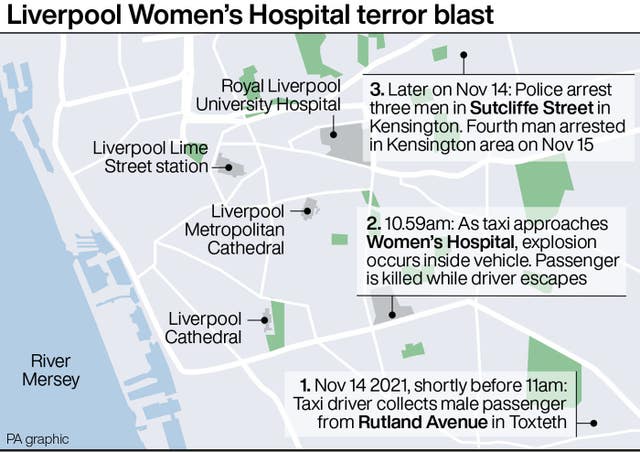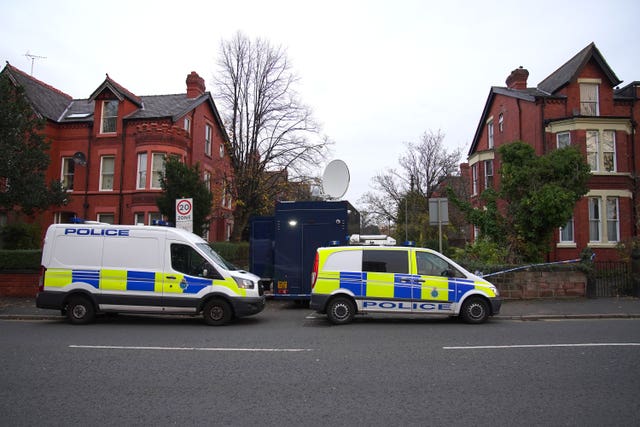Liverpool bombing suspect ‘was Christian convert who had asylum claim rejected’
Emad Al Swealmeen converted to Christianity at Liverpool’s Anglican Cathedral.

The suspected terrorist who blew himself up with a homemade bomb outside a hospital was a Christian convert who had reportedly had an asylum claim rejected in 2014.
Emad Al Swealmeen is said to have moved to the UK from the Middle East several years ago and been supported by a Christian couple who at one stage housed him in Liverpool.
The 32-year-old died after the device exploded in a taxi outside Liverpool Women’s Hospital shortly before 11am on Remembrance Sunday.
Police said it could take “many weeks” before they fully understand what happened in terms of planning, preparation and how things unfolded.
One unnamed source quoted in The Sun newspaper said an issue being considered is whether the suspected attacker was motivated by an “unresolved grievance” with the Home Office over a bid to become a UK resident.
Malcolm Hitchcott, who with his wife Elizabeth had taken Al Swealmeen in to live with them, said the suspect had first come to Liverpool’s Anglican Cathedral in 2015 and wanted to convert from Islam to Christianity.
Mr Hitchcott told The Sun: “He was destitute at that time and we took him in.
“The UK asylum people were never convinced he was Syrian and he was refused asylum in 2014.
“He had his case rejected because he has been sectioned due to some mental health incident where he was waving a knife at people from an overpass.”
Speaking to the BBC, Mrs Hitchcott said: “We’re just so, so sad. We just loved him, he was a lovely guy.”
Questioned if the couple were shocked by the incident, she added: “Very.”
Mr Hitchcott told ITV there was “never any suggestion of anything amiss” during the eight months Al Swealmeen lived with them.

A spokesman for Liverpool Cathedral said Al Swealmeen was baptised in 2015 and confirmed in 2017, but lost contact with the cathedral in 2018.
Bishop Cyril Ashton said: “Like so many, I have been shocked and saddened by the bombing in Liverpool and the revelation that the bomber was part of the cathedral community for a while.
“His confirmation was one of hundreds I have conducted as a bishop, so I have no specific recollection of the individual.
“The church takes confirmation seriously and I know that he would have been thoroughly prepared with an understanding of the Christian faith.
“It seems that, sadly, despite this grounding, the bomber chose a different path for his life. My prayers are with the cathedral, David Perry and the entire community at this time.”
The suspect, described as artistic and a motor racing fan by the couple, was reported to have changed his name to Enzo – after the renowned racing driver Enzo Ferrari.
The Sun reported that he was a Jordanian national who had spent time in Iraq, where his mother was from.
Home Office minister Damian Hinds was asked on Times Radio why the suspect had been allowed to stay in the country, but he said he could not comment due to it being a live investigation.
He said: “It is a live investigation and the police do have to have the space, the time, to be able to conduct that investigation fully and to carry on their searches of the key address and carry on with the analysis.”

Mr Hinds said it is “not impossible that there could be other people involved” and if that turns out to be the case, police will “make arrests quickly”.
He added: “I’m not in a position to be able to comment on the background of the individual, the deceased individual or to speculate about the case.”
The driver of the taxi, named locally as David Perry, survived Sunday’s incident and has since been discharged from hospital.
Four men arrested under terrorism laws in the Kensington area of Liverpool – three aged 21, 26 and 29, who were held on Sunday, and a man aged 20 who was detained on Monday – have now been released from police custody following interviews.
The UK terror threat level has been raised from substantial to severe following the incident, meaning an attack is “highly likely” rather than “likely”.
Searches were under way on Monday at Rutland Avenue, the address where detectives said Al Swealmeen was picked up by the taxi, and a second address in Sutcliffe Street, where officers believe he previously lived.
Detective Chief Inspector Andrew Meeks said: “We continue to appeal for any information about this incident and, now that we have released his name, any information that the public may have about Al Swealmeen, no matter how small, may be of great assistance to us.”
Assistant Chief Constable Russ Jackson, from Counter Terrorism Police North West, previously told journalists the explosive device had been “manufactured” and the force’s assumption was that it was built by Al Swealmeen in the taxi.

A motive is still unclear but the incident has been declared a terrorist attack.
MI5 is assisting police with the investigation.
In an update on Monday evening, Mr Jackson said “significant progress” had been made, but that there was a “considerable way to go” in understanding how the incident was planned, prepared for and how it happened.
He added: “Following interviews with the arrested men, we are satisfied with the accounts they have provided and they have been released from police custody.”
The head of the NHS in England praised staff at Liverpool Women’s Hospital who “really focused on maintaining services” despite a “really difficult 48 hours”.
Amanda Pritchard told BBC Radio 4’s Today programme: “We have written out to the NHS as we always do when the terror level changes just to make people aware of that.
“That will trigger of course people to look again at their local security arrangements – that’s completely normal, it is something that the NHS keeps under constant review because that confidence that patients need to feel that they can come in and out of hospitals in safety is paramount.”
Anyone who has any information is asked to call 0161 856 1027 quoting Liverpool Women’s Hospital incident.





